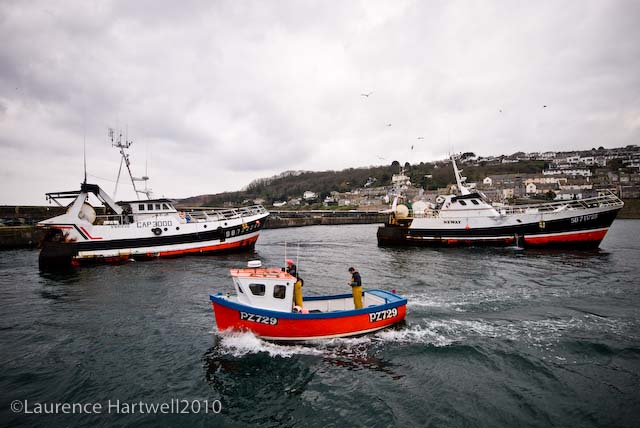 |
| The key extract from the letter which admits that Defra has known for 37 years that pollack stocks were on the decline. |
A letter from the Permanent Secretary to Environment Minister, Steve Barclay MP, has revealed that the Department for Environment, Food and Rural Affairs has known about the decline in pollack stocks for “over 37 years” but failed to act.
In June 2023, the development concerning the declining pollack stock in the ICES Areas 6 & 7 led to the International Council for the Exploration of the Sea (ICES) to issue a zero Total Allowable Catch (TAC) advice for pollack in 2024 to allow the stock to recover.
Ed. ICES picture of pollack is here - based on landing figures - in the last 25 years many boats have been removed from the fishing effort that would have contributed to higher landings going back that far - for a start, the Breton fleet that would have fished extensively in Area VII is a shadow of its former self and these days there is only one >12m trawler from Newlyn capable of catching pollack in any quantity.
This decision was accepted by the UK government who implemented a prohibition on a targeted pollack fishery in Area 7, in South-West England as of 01 January 2024. The decision prompted discussions on potential compensation schemes for affected fishermen, and on 10 April last, Environment Minister, Steve Barclay MP, announced a scheme which would see around 50 vessel owners directly compensated for half their income lost due to the bycatch-only pollack fishery. The Environment Minister took the decision to implement the compensation scheme directly via a ministerial direction.
On taking the decision, the Environment Minister had acted against the advice of Permanent Secretary at DEFRA, Tamara Finkelstein CB. The Permanent Secretary had written to the Minister outlining the steps taken by DEFRA, including measures to support affected pollack fishers. These measures include expediting Fisheries and Seafood Scheme (FaSS) applications for under-10 metre handline pollack fishers to facilitate diversification and initiating a scientific study led by Cefas to improve the evidence base on pollack stock.
However, Finkelstein also discussed the Minister’s request for a compensation scheme for fishermen in the South-West who were economically dependent on pollack fishing in 2023. Finkelstein stated that the proposal did not meet the requirements of the Accounting Officer test for Value for Money. She highlighted concerns about the availability of alternative income streams for fishermen, including publicly funded benefits payments and opportunities for diversification.
More disturbingly though, the letter reveals that DEFRA has known that pollack stocks have been in decline for “over the past 37 years”.
The letter states that fishermen should have taken steps to diversify, but the question has to be asked, “How could the fishermen targeting pollack in the South-West have known to diversify when the Department knew about the “clear downwards trajectory” of the fish stock, but fishermen were not informed?
It also begs the question, why is the government launching new research into pollack stocks if the information is already at hand, judging by the contents of the letter from the Permanent Secretary?
Responding to the revelation, Shadow Minister for Fisheries, Labour’s Daniel Zeichner told The Fishing Daily today:
“It is deeply concerning that DEFRA appear to have been tracking a downward trend in pollack for many years and yet failed to put in place any management measures to stop it. “This is an absolute failure of fisheries management that has left fishermen and their families struggling and a stock at risk. “There is a special irony that they seek to blame the fishermen dependent on the fishery for not having taken action earlier while Government themselves have taken no action. “It’s the job of the government to manage stocks, not fishermen. “How many more fisheries are in this position?” he concluded.



















